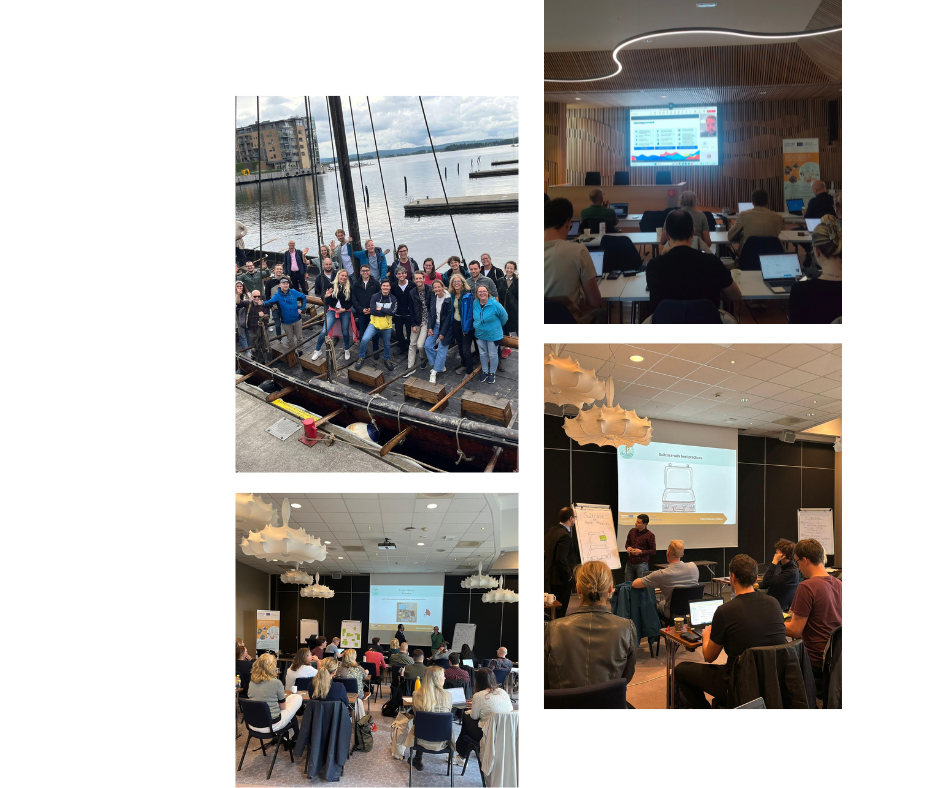Hosted by Tønsberg Kommune and Vestfold Countyv, ShareDiMobiHub gathered to discuss, share insights, and review the project's progress.
On May 30 and 31, 2024, the ShareDiMobiHub project partners gathered in Tønsberg, Norway. Hosted by Tønsberg Kommune and Vestfold Countyv, this meeting provided a platform to discuss, share insights, and review the project's progress following the “Shared and Digital Mobility Hubs” stakeholders event.
Day one updates
The meeting began with an official welcome from Magnus Ciril Martin of Tønsberg and Eric van Dijk from the Province of Utrecht. The day unfolded with a series of updates and interactive sessions:
Project coordinator Arjen provided an update on the project's status, sharing feedback on recent developments. He highlighted various deliverables that are in the pipeline and will soon be available to the public.
This was followed by a presentation from Hamburg University of Applied Sciences on the Digital Participatory Platform. This platform will capture and disseminate information from partners, demonstrating the potential for online and offline co-production. The digitalization of participation aims to increase the transparency and legitimacy of project applications and enhance the results' usefulness through greater engagement from partners and stakeholders. HAW showcased the current state of the platform and conducted a workshop with partners to understand city officers' needs regarding shared mobility hubs and how to maximize the platform's benefits.
Participants enjoyed a visit to the Tønsberg Castle Rock Tower, followed by discussions on improving the project's visibility and enhancing communication to reach a broader audience. POLIS presented various abstracts and upcoming conferences where the project or its pilot developments would be showcased.
The pilot cities provided updates on their progress, highlighting both the benefits and challenges of expanding shared mobility across different population sectors. The day concluded with an experience of one of the oldest forms of shared mobility and public transportation—the Viking culture and its aquatic transport methods. Thanks to Oseberg Viking Heritagev, partners learned about Norwegian Viking culture and Tønsberg's history, culminating in a journey on a replica of an ancient Viking ship.

Day two updates
The second day of the consortium started with the 6th project thematic meeting focused on integrating mobility hubs within the Mobility-as-a-Service (MaaS) concept. Arjen opened the thematic meeting, followed by presentations from Augustin Friedel from MHP and Daniel Stead from Trafi, who introduced potential MaaS solutions and discussed the efficacy of using white-label solutions. Thomas de Bassompierre shared insights into STIB-MIVB Brussels' Floya MaaS app.
The Province of Utrecht outlined a collaborative tender with Utrecht and Amersfoort cities to experiment with MaaS, with Eric van Dijk and Wouter Slob discussing potential use cases with MaaS providers. José van der Plaat elaborated on cooperative efforts in Amsterdam regarding MaaS and shared mobility.
Updates on digitalization and upscaling plans from Amsterdam and Leuven followed. The University of Antwerp presented an impact assessment, providing valuable metrics on the project's effectiveness. The consortium concluded with a visit to a key mobility hub at the railway station, showcasing a tangible example of urban transformation.
The ShareDiMobiHub consortium's meeting in Tønsberg provided a valuable opportunity for partners to engage in meaningful discussions and share critical updates. The integration of Mobility-as-a-Service (MaaS), digital participation platforms, and shared mobility hubs were central themes, highlighting the project's innovative trajectory.
Key takeaways included insights into the practical applications of MaaS solutions, the benefits of increased digital engagement, and the challenges faced by pilot cities. The interactive sessions and workshops facilitated a deeper understanding of city officers' needs and fostered a collaborative environment for problem-solving.
